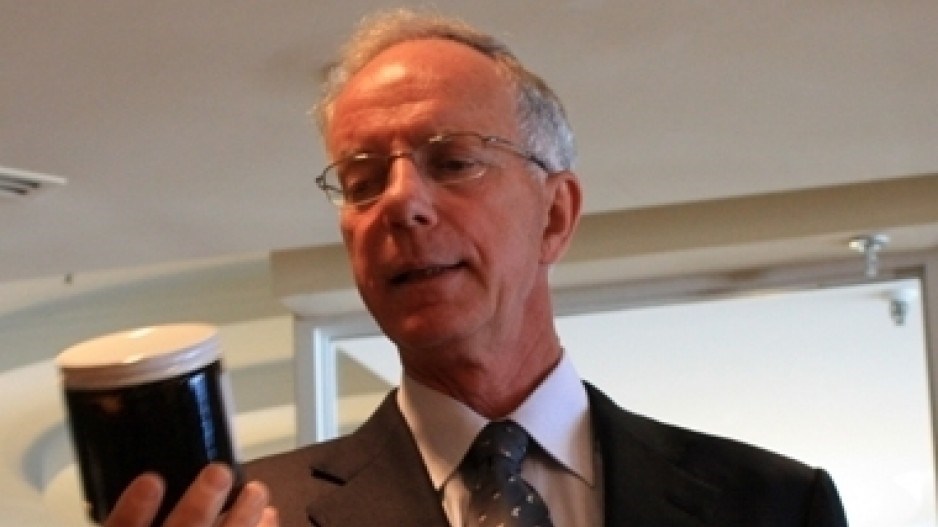Newspaper mogul David Black intends to begin the lengthy environmental review process for his proposed $26 billion Kitimat Clean heavy-oil refinery project in northwest British Columbia before the end of the year.
Black, who announced his intentions to build the large-scale refinery last year, told Business in Vancouver that he has the "basic configuration nailed down" and is preparing to submit the necessary paperwork for environmental review, a process Black anticipates will take two years.
"I have spoken with the government, and I'm not anticipating any trouble [because] this project is vital to Canada's interests," Black said.
During the environmental review process, Black said he plans to commission a feasibility study of Kitimat Clean.
The report will include detailed designs and a complete cost breakdown of the project.
Thus far, Black has only discussed preliminary costs of Kitimat Clean: $18 billion to build the refinery, $6 billion to build a pipeline carrying bitumen west from the Alberta oilsands, $1 billion toward the cost of a natural gas pipeline for gas to run the plant and $1 billion for a tanker fleet.
Black is hoping to piggyback on other natural gas pipelines expected to be built for the liquefied natural gas export facilities proposed in the area.
The feasibility study is expected to cost $200 million, which Black still has to raise.
"But we have to do that study," said Black. "No one will fund this until that is done."
Earlier this year, Kitimat Clean signed a memorandum of understanding with the Industrial and Commercial Bank of China that stipulates the bank will act as both investor and financial adviser for Kitimat Clean.
Black said he expects $18 billion for the refinery to come from Chinese investors – China is the anticipated destination for Kitimat Clean products. He hopes to raise another $8 billion with the help of a loan guarantee from the federal government. The Black Press CEO announced his intention to seek the loan guarantee from Ottawa at an energy conference in Calgary last month.
He has long contended that his refinery proposal has the support of British Columbians because shipping refined products such as gasoline, the type of product Black's refinery could produce, is considered less damaging than shipping bitumen in the event of a spill.
Initially, Black pitched Kitimat Clean as a way of building support for Enbridge's (TSX:ENB) Northern Gateway pipeline, which proposed sending bitumen from Alberta's oilsands to the coast to be shipped to Asian markets. But Black said the project is no longer "necessarily tied to Enbridge."
According to a poll commissioned by Black in September 2012, 37% of British Columbians are in favour of refining oil in B.C. rather than shipping it offshore to be refined and 35% are somewhat supportive. Only 15% of respondents were somewhat opposed, while 13% were entirely opposed.
"It's just safer. I'm not suggesting there will be an accident," said Black."It's not perfect, but if there is an accident, you don't want it to be bitumen."
Industry, however, has yet to back the venture. Enbridge has not publicly endorsed the refinery.
Greg Stringham, vice-president of oilsands and markets with the Canadian Association of Petroleum Producers (CAPP), said refineries come with "significant complexities."
For example, different regions require different petroleum products; some may need more diesel, while others may need more gasoline. Shipping an already refined product restricts the sale of that product to a region that needs it.
"Refineries are typically built next to consumers to meet the demands of that market," said Stringham. "If you refine to meet Chinese specifications, then what happens if they don't want it?"
Stringham added that another drawback is an increase in greenhouse gas emissions in Canada from the refining process.
Black acknowledged that his refinery would increase emissions but said he plans to use a refining method known as Fischer-Tropsch that he claims would cut emissions from Kitimat Clean in half.
"Refineries put out a lot of emissions, but the chance to cut those emissions in half is huge," said Black. "And refineries will get built, if not here then in Asia. Let's do it in our backyard."
Kitimat Clean is proposed for a site midway between Kitimat and Terrace. Black anticipates the project will take a minimum of eight years to complete. •
With files from dailyoilbulletin.com




